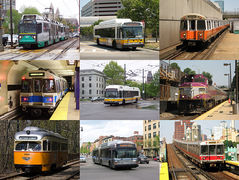 MBTA vehicles by Adam E. Moreira MBTA vehicles by Adam E. Moreira Boston's MBTA is an example of the unfortunate reality that many U.S. transit systems are in desperate need of revitalization funds and operating funds right away - now, this instant, ASAP! Even with a great proponent of value capture leading the charge for MBTA (as I've mentioned before, Stephanie Pollack is pushing transit value capture in Massachusetts), the dire need for new funds has shifted attention from long-term transit value capture options to near-term solutions, like fare hikes. As reported by WCVB, officials are resorting to fare hikes having explored other options including real estate transactions. While WBUR has suggested that there is substantial push back on the fare hike proposals, including from citizens at the first of twelve public meetings being held this month, there was also skepticism about the viability and appropriateness of value capture. The Worcester Business Journal reported that officials and advocates wanted more time to consider value capture (TIF funding in this case). Tom Ryan, manager of public policy and government affairs at A Better City, said. "However, the details behind value capture are in need of special attention and, if implemented inappropriately, have negative implications." While many officials support value capture and believe it should be incorporated into MBTA's long-term funding mix, it isn't a silver bullet that can be loaded and fired at a moments notice. Even the sell-off of existing MBTA real estate assets would take time to broker, and then the revenues would yield one-time payments. Entering into long-term leases might provide more stable revenues, but payments would be relatively small compared to cost of building or operating transit and the payment period may only begin once a developer started construction or perhaps even reached a significant level of occupancy in a newly built project. To have a meaningful impact on agency finances, a transit value capture strategy must consist of numerous tactical approaches and be implemented in a consistent manner across broad geographies. I would suggest that this sentiment is shared by some value capture detractors in Boston, like Mr. Ryan of A Better City as quoted in the WBJ. While some form of value capture may have merit, it is a small and piecemeal approach to the challenge associated with the goal of seeing a 21st century, world-class transit system that will serve both today and the future economic needs of the commonwealth. But every journey begins with a single step. By definition, a consistent, broad, and diverse value capture strategy begins with a one-off, focused, and singular choice to implement a particular value capture tactic. And now seems like a good time to implement value capture in Boston. It's just too bad that even when the political will exists and political policy window opens, near-term solutions are needed and long-term solutions are put on the back burner. Fare hikes may be necessary to keep the trains and buses running, but I hope that leaders in Boston continue to explore the long-term potential of transit value capture.
0 Comments
Leave a Reply. |
AuthorIan Carlton is a transportation and land use expert specializing in transit-oriented development (TOD). He helps clients - including transit agencies, planning departments, and landowners - optimize real estate development around transit. Archives
March 2019
CategoriesSpecial thanks to Burt Gregory at Mithun for permission to use the Portland Streetcar image above.
|
Photo from permanently scatterbrained
 RSS Feed
RSS Feed

